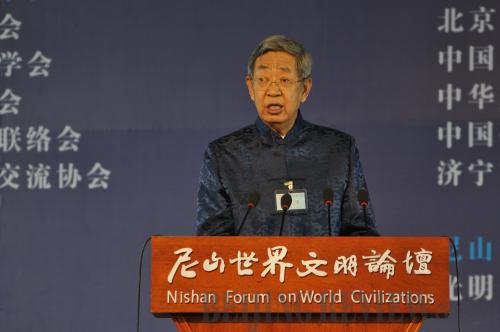|
 |
|
INITIATOR OF DIALOGUE: Xu Jialu, Chairman of the Organizing Committee of the Nishan Forum on World Civilizations, makes a speech at the opening ceremony of the forum on September 26 (YUAN YUAN) |
The Guangming Daily recently interviewed Xu Jialu, Chairman of the Organizing Committee of the Nishan Forum on World Civilizations, and President of the Advanced Institute for Confucian Studies of Shandong University, who shared his views on dialogues among civilizations. Edited excerpts follow:
Guangming Daily: Dialogue is the buzz word at this forum. As the forum's initiator, what is your understanding of dialogue?
Xu Jialu: In recent years, I have communicated with representatives of Buddhism, Taoism, Christianity and Judaism. I also had face-to-face talks with followers of Islam and Brahmanism. In the past 300 years, the world has entered an era where cultural diversification and centralization exist at the same time and conflict with one another. The result of this conflict will eventually decide the fate of human society.
Before the Industrial Revolution, the dialogues among different cultures were limited and spontaneous and mainly took place in the form of trade, religious preaching and war. After the Industrial Revolution, all civilizations made stronger efforts to embrace the world. For example, in the 18th and 19th centuries, Europe considered itself the center of the world, and the colonization movement, along with the Gospel of Jesus Christ, forced its way across the world. In the 20th century, the United States replaced Europe as the "center of the world" and continued to seek the unification of world civilizations. For more than two centuries, weaker nations and regions faced a cruel reality as their own traditions were abandoned, eliminated and forgotten.
The tendency toward the unification of civilizations has been prevailing and surely influenced the thinkers of different periods. What has this tendency brought to the thinkers? The fact was that the concept of civilization unification has been fully adopted—from institutional designs to religious beliefs and philosophical thought.
However, while there was tremendous pressure for the unification of civilizations, powerful forces emerged to preserve traditions and resist the movement of unifying civilizations. Since the end of the last century, the tendency of this unification has been weakened, to a certain degree, by the outcry for the diversification of civilizations. The global call for diversification has been driven by economic globalization and science and technology modernization, originating in the West. Once things reach an extreme, they often develop in the opposite direction. When the force pushing for unification reached its limit, there was a call for diversification.
Can you elaborate on the unification and diversification of global civilizations?
Today, more and more people have realized that cultural diversification is the essential attribute of human civilization. The connection, collision and compromise among civilizations drive the development of those civilizations. In this way, different civilizations can share, appreciate and adopt parts of other cultures, and adapt to an ever-changing world. If a culture lacks diversification or contact with other cultures, it will disappear in the end.
Although there is a strong demand for the diversification of civilizations, the voice for this change is still very weak, as one civilization is often at odds with another by nature. That is why I say the battle between the unification and diversification of cultures will be long-term, in both theoretical and practical fields. The wise choice is to show the necessity for cultural diversification and make efforts in this direction, eventually building the world into a friendly, harmonious and happy home for everyone.
People now need frank and friendly communications, which we usually call "dialogues." The world needs dialogues.
|
